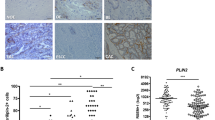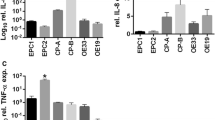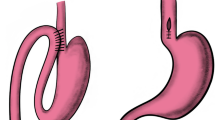Abstract
Background Obesity is an important risk factor for Barrett adenocarcinoma. However, the role of adiponectin (anti-inflammatory adipokine from adipose tissue) and ghrelin (orexigenic peptide gastric origin) on the progression of Barrett’s carcinogenesis has not been investigated so far. The aim of the present study was: (1) to compare the expression of adiponectin and ghrelin receptors in Barrett’s esophagus and in normal squamous epithelium; (2) to assess the effect of adiponectin and ghrelin on apoptosis in Barrett’s adenocarcinoma cells in vitro; and (3) to investigate the effect of ghrelin on IL-1β and COX-2 expression in OE-19 cells incubated with TNFα. Methods The expression of ghrelin and adiponectin receptors (GHS-R1a, Adipo-R1, Adipo R-2) in biopsies from Barrett’s esophagus and in Barrett’s adenocarcinoma cell line OE-19 was assessed by quantitative RT-PCR (qRT-PCR). The OE-19 cells were also incubated with adiponectin (5–10 μg/ml), and the apoptosis and proliferation were assessed by FACS and MTT assays. Additionally, effects of adiponectin on the mRNA and protein expression of proapoptotic Bax and antiapoptotic Bcl-2 were assessed by RT-PCR and Western blot, respectively. In two different in vitro models of esophagitis the OE-19 cells were incubated with ghrelin alone or in the presence of TNFα or bile acids in the normal or pulse acidified medium, and the expression of IL-1β and COX-2 as markers for inflammation were assessed by FACS and qRT-PCR, respectively. Results Adiponectin caused a significant increase in apoptosis, and this affect was accompanied by increased Bax and decreased Bcl-2 expression. In contrast, ghrelin had no effect on apoptosis of OE-19 cells incubated in neutral or acidified medium with or without addition of deoxycholic acid. At the mRNA level, the expression of adiponectin receptors (Adipo-R1, Adipo-R2) was decreased, and the expression of ghrelin receptor (GHS-R1a) was increased in Barrett’s mucosa. Ghrelin caused a decrease in TNFα-induced COX-2 and IL-1β expression in OE-19 cells. Conclusion Adiponectin and ghrelin have an inhibitory effect on Barrett’s carcinogenesis by two different mechanisms: (1) by an increase in apoptosis by adiponectin, and (2) by anti-inflammatory actions of ghrelin. The decrease in levels of these two peptides in obesity may explain the progression of Barrett’s carcinoma in obese individuals.










Similar content being viewed by others
References
Jankowski JA, Harrison RF, Perry I, Balkwill F, Tselepis C (2000) Barrett’s metaplasia. Lancet 356:2079–2085
Lagergren J (2005) Adenocarcinoma of oesophagus: what exactly is the size of the problem and who is at risk? Gut 54(Suppl 1):1–5
Sharma P, Sampliner RE (2002) Barrett esophagus. Curr Opin Gastroenterol 18:471–478
Menges M, Muller M, Zeitz M (2001) Increased acid and bile reflux in Barrett’s esophagus compared to reflux esophagitis, and effect of proton pump inhibitor therapy. Am J Gastroenterol 96:331–337
Stein DJ, El-Serag HB, Kuczynski J, Kramer JR, Sampliner RE (2005) The association of body mass index with Barrett’s oesophagus. Aliment Pharmacol Ther 22:1005–1010
Trujillo ME, Scherer PE (2006) Adipose tissue-derived factors: impact on health and disease. Endocr Rev 27:762–778
Okamoto Y, Kihara S, Funahashi T, Matsuzawa Y, Libby P (2006) Adiponectin: a key adipocytokine in metabolic syndrome. Clin Sci 110:267–278
Funahashi T, Matsuzawa Y (2006) Hypoadiponectinemia: a common basis for diseases associated with overnutrition. Curr Atheroscler Rep 8:433–438
Ishikawa M, Kitayama J, Kazama S, Hiramatsu T, Hatano K, Nagawa H (2005) Plasma adiponectin and gastric cancer. Clin Cancer Res 11:466–472
Otake S, Takeda H, Suzuki Y, Fukui T, Watanabe S, Ishihama K, Saito T, Togashi H, Nakamura T, Matsuzawa Y, Kawata S (2005) Association of visceral fat accumulation and plasma adiponectin with colorectal adenoma: evidence for participation of insulin resistance. Clin Cancer Res 11:3642–36462
Tworoger SS, Eliassen AH, Kelesidis T, Colditz GA, Willett WC, Mantzoros C, Hankinson SE (2007) Plasma adiponectin concentrations and risk of incident breast cancer. J Clin Endocrinol Metab 92:1510–1516
Soliman PT, Wu D, Tortolero-Luna G, Schmeler KM, Slomovitz BM, Bray MS, Gershenson DM, Lu KH (2006) Association between adiponectin, insulin resistance, and endometrial cancer. Cancer 106:2376–2381
Brakenhielm E, Veitonmaki N, Cao R, Kihara S, Matsuzawa Y, Zhivotovsky B, Funahashi T, Cao Y (2004) Adiponectin-induced antiangiogenesis and antitumor activity involve caspase-mediated endothelial cell apoptosis. Proc Natl Acad Sci USA 101:2476–2481
Kojima M, Kangawa K (2006) Drug insight: the functions of ghrelin and its potential as a multitherapeutic hormone. Nat Clin Pract Endocrinol Metab 2:80–88
Date Y, Kojima M, Hosoda H, Sawaguchi A, Mondal MS, Suganuma T, Matsukura S, Kangawa K, Nakazato M (2000) Ghrelin, a novel growth hormone-releasing acylated peptide, is synthesized in a distinct endocrine cell type in the gastrointestinal tracts of rats and humans. Endocrinology 141:4255–4261
Inui A, Asakawa A, Bowers CY, Mantovani G, Laviano A, Meguid MM, Fujimiya M (2004) Ghrelin, appetite, and gastric motility: the emerging role of the stomach as an endocrine organ. FASEB J 18:439–456
Cummings DE, Weigle DS, Frayo RS, Breen PA, Ma MK, Dellinger EP, Purnell JQ (2002) Plasma ghrelin levels after diet-induced weight loss or gastric bypass surgery. N Engl J Med 346:1623–1630
Suematsu M, Katsuki A, Sumida Y, Gabazza EC, Murashima S, Matsumoto K, Kitagawa N, Akatsuka H, Hori Y, Nakatani K, Togashi K, Yano Y, Adachi Y (2005) Decreased circulating levels of active ghrelin are associated with increased oxidative stress in obese subjects. Eur J Endocrinol 153:403–407
Dixit VD, Schaffer EM, Pyle RS, Collins GD, Sakthivel SK, Palaniappan R, Lillard JW Jr, Taub DD (2004) Ghrelin inhibits leptin- and activation-induced proinflammatory cytokine expression by human monocytes and T cells. J Clin Invest 114:57–66
Li WG, Gavrila D, Liu X, Wang L, Gunnlaugsson S, Stoll LL, McCormick ML, Sigmund CD, Tang C, Weintraub NL (2004) Ghrelin inhibits proinflammatory responses and nuclear factor-kappaB activation in human endothelial cells. Circulation 109:2221–2226
Konturek PC, Brzozowski T, Walter B, Burnat G, Hess T, Hahn EG, Konturek SJ (2006) Ghrelin-induced gastroprotection against ischemia-reperfusion injury involves an activation of sensory afferent nerves and hyperemia mediated by nitric oxide. Eur J Pharmacol 536:171–181
Brzozowski T, Konturek PC, Sliwowski Z, Pajdo R, Drozdowicz D, Kwiecien S, Burnat G, Konturek SJ, Pawlik WW (2006) Prostaglandin/cyclooxygenase pathway in ghrelin-induced gastroprotection against ischemia-reperfusion injury. J Pharmacol Exp Ther 319:477–487
Ogunwobi OO, Beales IL (2006) Adiponectin stimulates proliferation and cytokine secretion in colonic epithelial cells. Regul Pept 134:105–113
Dieudonne MN, Bussiere M., Dos Santos E, Leneveu MC, Giudicelli Y, Pecquery R (2006) Adiponectin mediates antiproliferative and apoptotic responses in human MCF7 breast cancer cells. Biochem Biophys Res Commun 345:271–279
Wang Y, Lam KS, Xu JY, Lu G, Xu LY, Cooper GJ, Xu A (2005) Adiponectin inhibits cell proliferation by interacting with several growth factors in an oligomerization-dependent manner. J Biol Chem 280:18341–18347
Kadowaki T, Yamauchi T, Kubota N, Hara K, Ueki K, Tobe K (2006) Adiponectin and adiponectin receptors in insulin resistance, diabetes, and the metabolic syndrome. J Clin Invest 116:1784–1792
Author information
Authors and Affiliations
Corresponding author
Rights and permissions
About this article
Cite this article
Konturek, P.C., Burnat, G., Rau, T. et al. Effect of Adiponectin and Ghrelin on Apoptosis of Barrett Adenocarcinoma Cell Line. Dig Dis Sci 53, 597–605 (2008). https://doi.org/10.1007/s10620-007-9922-1
Received:
Accepted:
Published:
Issue Date:
DOI: https://doi.org/10.1007/s10620-007-9922-1




